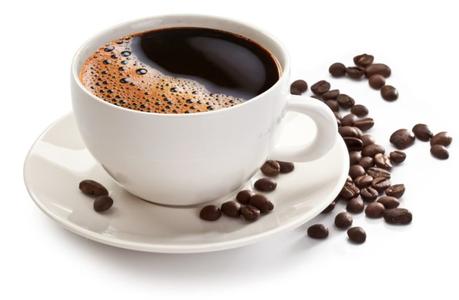
Last month, I started an experiment to better understand how different foods and lifestyle decisions impact blood sugar, using a constant-glucose-monitoring device.
For the last few weeks, I've been testing whether or not drinking coffee raises my blood-sugar levels.
The answer may seem obvious as coffee contains no sugar, but some people believe coffee can have an effect, and our first coffee experiment indicated just that.
Since then, I've repeated the experiment twice. Here's what I found.
Planning the coffee experiment
I designed the following experiment: I would drink a cup of coffee and measure my blood-sugar levels two hours prior to and after drinking it. Then I would analyze the data to see if drinking coffee seemed to raise my blood-sugar levels.
To increase the reliability of the experiment, I made sure of four things:
1. I would drink the coffee black - nothing would be added to it.
2. I wouldn't eat or drink anything else, feel stressed, nor do any form of exercise, 2 hours prior to and after drinking the coffee.
3. I would eat ketogenic.
4. I would go to bed and wake up around the same time as I normally do.
It was coffee time.
Drinking coffee
The house was quiet, but I was up, feeling excited about doing another experiment. Everything was ready - beans, scale, grinder, and coffeemaker. The glucose sensor was safely installed in my body - constantly monitoring any change in blood-sugar levels.
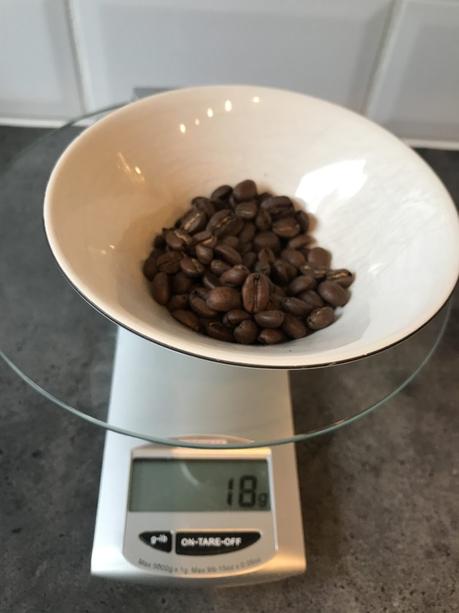
Using the above food scale, I put 0.63 ounces (18 grams) of coffee beans into the grinder (about the same amount as for a double espresso). I turned it on. "Grrrrooooooooooooooooouhhh", it sounded like an elephant had been let loose in the kitchen!
After 20 seconds, the noise finally stopped. I picked up the coffee-bean container, held it to my nose, and inhaled. "Mmmmmmmm, what a delicious smell!".
I poured the coffee into the Bialetti coffee maker along with 7 oz (2 dl) of boiling water. A few minutes later the coffee was ready. I immediately took a sip. "Oooh, powerful!".
The coffee didn't taste as well as it normally does as I hadn't added any cream - my favorite coffee is the Creamuccino - coffee with steamed cream - but I couldn't have that this morning as it would affect the experiment. Still, the coffee was nice and a few minutes later there was no more.
Using the constant-glucose-monitoring app I was watching any change in my blood-sugar levels like a hawk. "Ohhhhhh, interesting!".
Coffee does NOT seem to raise my blood-sugar levels
The graphs below show my blood-glucose levels over a 4-hour period for three separate experiments. The blue line is the blood glucose on a morning I drank coffee. The red line is on a morning without coffee.
Experiment one
The first experiment indicated that coffee may raise my blood sugar. But only slightly:
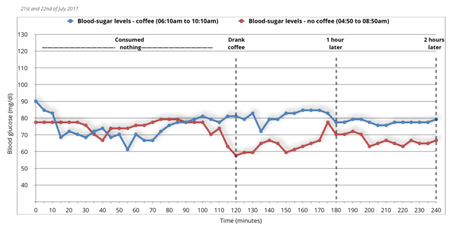
The graph above could suggest that drinking coffee prevents my blood-sugar levels from dropping to the same levels as the morning when I didn't drink coffee.
Experiment two
The second experiment indicates that coffee does NOT noticeably raise my blood sugar. There's a lot of variety in my blood-glucose levels on these two days, but to us it seems that coffee does not raise my blood sugar relative to not drinking coffee (the control).
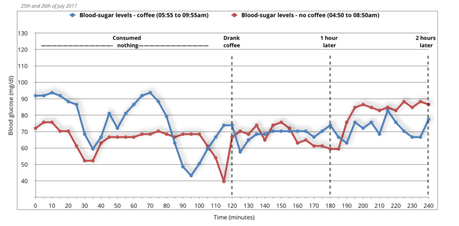
Experiment three
The third experiment also suggests that coffee does not raise my blood sugar much. My blood-sugar levels are quite flat, both on the morning when I drank coffee and the morning I didn't, indicating that the coffee didn't impact my blood-sugar levels much.
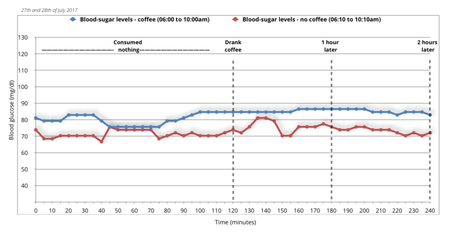
Conclusion
The chart below shows my average blood-sugar levels based on the three experiments.
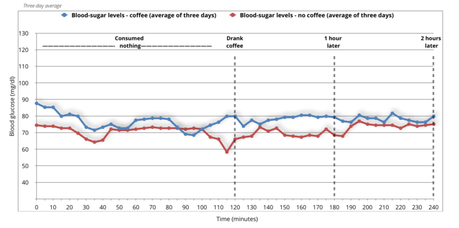
To me, this indicates that drinking coffee does not significantly raise my blood-sugar levels.
But, the chart also indicates that my blood-sugar levels on coffee-drinking mornings are on average slightly higher than on mornings I didn't drink coffee.
However, this difference is not significant and could be due to random variance in blood-sugar levels (see for example how the blood-sugar levels start out higher on coffee-drinking mornings even though I haven't had any coffee yet).
No significant change in blood-ketone levels
The below chart shows my average blood-ketone levels on coffee-drinking mornings for experiment two and three (regretfully, I didn't measure ketones for the first experiment).
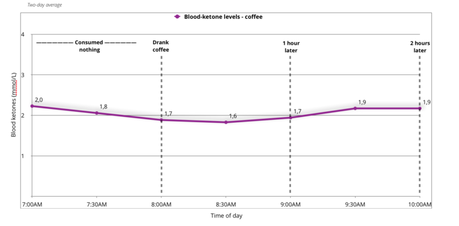
To us, this graph also seems to indicate that coffee does not raise my blood sugar significantly.
If coffee had raised my blood-sugar levels significantly, we would have expected insulin levels to increase as well, causing a subsequent drop in ketone levels. But there was no significant decrease in ketone levels after drinking coffee.
What happens to your blood-sugar levels when you drink coffee?
Please note: This is a n=1 self experiment and my findings may not apply to you. I am a 36-year old insulin-sensitive male, weigh 152 pounds (69 kg), exercise for 10-15 minutes five times a week, with no history of obesity or diabetes.Although coffee doesn't seem to raise my blood-sugar levels, the same may not be the case for you.
What happens to your blood sugar when you drink coffee? Let us know in the comments below.
How to test
To test what happens to your blood-sugar levels after drinking coffee, do this:
1. Eat and drink nothing for 2 hours.
2. Measure your blood glucose - this is your baseline.
3. Drink a cup of coffee with nothing added to it (no sugar, no sweeteners, no milk, no cream etc.). Don't eat or drink anything else for the next two hours, and avoid exercise and stress (these can impact blood sugar).
4. Measure your blood-sugar levels every 30 minutes up to two hours after drinking the coffee (five times in total including the baseline measurement).
5. Evaluate your results. Is there a significant increase or reduction in your blood-sugar levels? *
What do you want us to test next?
We've received lots of suggestions for what else to test, for example sugar alcohols, more artificial sweeteners, fasting, alcohol, and resistant starch. What else would you like us to test?
Thanks for suggesting ways to improve these experiments. As per your request, we'll measure ketones in addition to blood sugar. However, for the experiments we've already done but not yet published, ketones data may lack.
Measuring insulin levels is tricker. Do you know of a reliable and simple way to measure it several times per hour? Let us know in the comments below.
Earlier experiments
Are you interested in our earlier tests? Check out the series:
- Why You're Not in Ketosis
- How Much Protein Can You Eat in Ketosis?
- What to Eat in Ketosis
- Do Artificial Sweeteners Affect Blood Sugar?
- Does Coffee Raise Blood Sugar? Preliminary Findings

